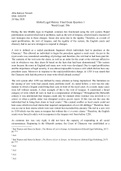Alba Kalayci Nicault
SNR: 2036559
26 May 2020
Global Legal History: Final Exam Question 1
Word Count: 596
During the late Middle Ages in England, common law functioned using the writ system. Rapid
proliferation occurred which led to problems, such as the writ of trespass, which forced a reaction of
new strategies due to these changes. Issues also arose due to the rigidity. Therefore, as a result of
rapid proliferation, the writ of trespass, and the rigidity of the system, the English courts and
chancery had to use new strategies to respond to changes.
A writ is defined as a sealed parchment fragment which individuals had to purchase at the
Chancery.1 This allowed an individual to begin the procedure against a royal court. Access to the
royal courts was considered something of privilege and therefore, the writ had to had been paid for.
The contents of the writ were the claim, as well as an order for the court or the relevant official to
rule in whichever way they deem fit based on the facts that had been demonstrated.2 This system
soon became the norm in England and many new writs were developed. Due to rapid proliferation
and the importance of legal security, it was almost impossible to issue a writ which did not have any
precedent cases. Moreover in response to the rapid proliferation change, in 1258 it was stated that
the Chancery only had the power to issue writs which already existed.3
The writ system after 1258 was defined by many scholars as being impractical. The limitation on
the issuing of new writs had caused many problems itself. As stated before, a writ was the only
manner in which a litigant could bring their case in front of the royal court. As a result, many cases
were left without remedy. A clear example of this is the writ of trespass. It constituted a broad
category of writs which all were to lead to a compensation of damages.4 Throughout the thirteenth
century it was determined that trespass could only be claimed when violence was involved (vi et
armis) or when a public order was disrupted (contra pacem regis). If this was not the case the
individual had to bring their claim to local courts.5 This created conflict as local courts could not
heat cases which involved claims that required compensation of over 40 shillings.6 Therefore, there
was no one to hear claims which were non violent but exceeded this amount. This led to a new writ
in 1350 which was the same as trespass but without the vi et armis clause.7 Therefore, the English
courts were forced to add a writ in response to the trespass writ from before 1258.
As common law was very rigid, it did not have the capacity of responding to all social
circumstances. Beginning in the fifteenth century, the Court of Chancery was established as a
1Bart Wauters and Marco de Benito , The History of Law in Europe: An Introduction (Edward Elgar Publishing, 2017)
pg. 151
2 ibid.
3Bart Wauters and Marco de Benito , The History of Law in Europe: An Introduction (Edward Elgar Publishing, 2017)
pg. 152
4 ibid.
5 ibid.
6 ibid.
7 ibid.
, response. The Chancellor, head of the Court of Chancery was authorised to issue decrees that would
be applicable to certain cases in question. These were to be done in his own name and did not
involve the writ system.8 This was known as the “court of conscience” and it was successful due to
its new remedies, increased flexibility, absence of juries, investigation by judge and increased
attention to facts.9
In conclusion, the writ system was successful for a time however due to rapid proliferation, the writ
of trespass, and the rigidity of the system, the English courts and chancery were forced to adapt by
adding new strategies in the form of limitation of establishing new writs in 1258, a new writ in 1350
and the Court of Chancery in the 15th century.
8Bart Wauters and Marco de Benito , The History of Law in Europe: An Introduction (Edward Elgar Publishing, 2017)
pg. 154
9Bart Wauters and Marco de Benito , The History of Law in Europe: An Introduction (Edward Elgar Publishing, 2017)
pg. 155





